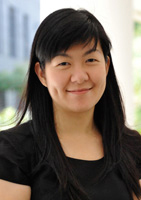There will be a departmental talk next Tuesday on 5 April (4pm) by Dr. Alice Chan. More details are appended below. This talk will be held in Seminar Room B, AS7-01-17. For more information on talks, please visit the departmental blog at https://blog.nus.edu.sg/psychology/.
Title: Behavioral and neuroimaging evidence for the effects of language and culture on sensory perception
Abstract:
There has been growing evidence that demonstrates cultural experiences, such as language, may shape our brains and affect the way we see the world. In this talk, I will present brain imaging studies (fMRI) and behavioral experiments that aim to investigate how higher-order cognitive functions such as language and other social experiences influence sensory perception. Findings from the two fMRI experiments that employed rapid color discrimination paradigms suggested that language not only automatically engages during color perception but also potentially facilitates perception. I will also discuss a series of behavioral and a fMRI study that were tested on members from different cultural backgrounds (East Asian and Western) to delineate culture-sensitive neural mechanisms of auditory perception. Taken together, these data provide neural bases in support of the new perspective of non-universality of sensory perception.
Speaker’s Profile:
Dr Chan joined Linguistics and Multilingual Studies in the School of Humanities and Social Sciences in NTU in 2010. Dr Chan received her PhD in Linguistics Department from the University of Hong Kong in 2006. She worked at the State Key Laboratory of Brain and Cognitive Sciences, University of Hong Kong as a postdoctoral fellow before she joined the Communication Neural Systems Research Group in Dept of Communication Sciences and Disorders, Northwestern University as a research associate in 2008. Dr Chan has published research articles in PNAS, NeuroImage, Neuropsychologia, Journal of Cognitive Neuroscience, among others.
Her research work mainly utilizes neuroimaging (fMRI) and behavioral measures to investigate how cultural experiences such as language and socialization may shape our brains and affect the way we see and hear the world. Her studies demonstrated that auditory perception pattern is different between members from the East Asian and Western cultures, which is in connection with previous findings on visual perception. She is interested in looking at the underlying cognitive and neuroanatomical mechanisms as well as genetic bases of these culturally sensitive perceptual patterns and behaviors. Her current work also focused on studying the neurophysiological representations of the Whorfian hypothesis.


